小学英语代词
小学英语语法-代词
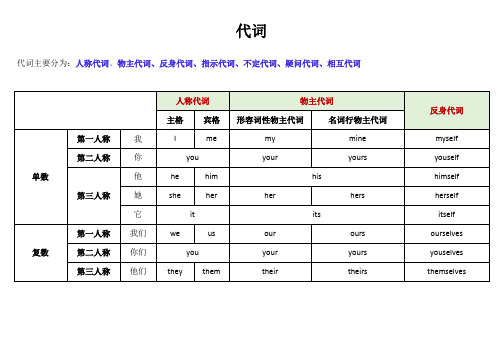
代词
代词主要分为:人称代词、物主代词、反身代词、指示代词、不定代词、疑问代词、相互代词
多个人称代词病理使用的顺序:
●单数人称代词:第二人称you>第三人称he/she/it>第一人称I
●复数人称代词:第一人称we>第二人称you>第三人称they
●形容词性物主代词后面要+名词,不可单独使用
●名词行物主代词=形容词性物主代词+名词,可单独使用
●单数反身代词词尾都有-self,复数反身代词词尾都有-selves
●第一/二人称反身代词由”形容词性物主代词+self/delves”构成,第三人称的反身代词由”宾格+self-selves”构成
疑问代词
复合不定代词
●谓语均用单数
●—one和—body用于指指代人,—thing用于指代物
●some—和any—组成的复合不定代词和some/any用法差不多
There's something interesting in thsi book
Do you want something else? 你还想要其他东西吗?
There isn’t anything on the table 桌子上什么都没有。
小学英语代词完整ppt课件
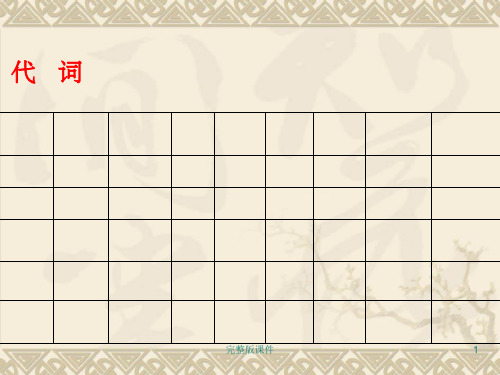
their
完整版课件
8
名 词性物主代词
单数
复数
第一人称 mine 第二人称 yours 第三人称 his /hers/its
ours yours theirs
完整版课件
9
John’s family photo
John and Mike are talking about John’s family photo.
( your, I , he, his) 7.Can he go with___u_s______? ( we, us , our) 8.__O_u_r_____ classroom is very dirty. Let___u_s____ clean it.
( our, we, us )
9. How old are ___y_o_u______? I am 12 years old.
John : look! This is _m_y father. _H_e is a doctor, and _H_eworks in DongGuan people hospital. H_e_is kind and _w_eall love_hi_m.
Mike: Is that woman y_o_u_r mother?
人称代词有 单数 和 复数 之分,
第一人称: I
we
第二人称: you
you
第三人称 : he/she/it they
人称代词有主格 和 宾格之分
I – me
you---you
we----us
you --- you
he --- him they---them
she --- her
完整版课件
小学英语代词总结及练习

一、代词分类:一、人称代词是表示"我"、"你"、"他"、"她"、"它"、"我们"、"你们"、"他们"的词;是表示自身或人称的代词;人称代词有人称、数和格的变化,见下表:二、物主代词是表示所有关系的代词;物主代词可分为和名词性物主代词两种;列表如下; 如:I like his car.我喜欢他的小汽车; Our school is here,and theirs is there. 我们的学校在这儿,他们的在那儿;三、指示代词是表示这个,那个,这些,那些以及it, such, same等词;指示代词在句中作主语, 宾语, 表语, 定语;指示代词分单数this / that和复数these / those两种形式,This girl is Mary. Those men are my teachers.This is Mary. Those are my teachers.That is a red car. 那是一辆红色汽车;What do you like I like this. 你喜欢什么我喜欢这个;I should say I know that. 我应该说我知道这件事情;四、反身代词是表示我自己,你自己,他自己,我们自己,你们自己,他们自己等的词;反身代词第一, 二人称构成是由形容词性物主代词加"-self " 复数加-selves 构成; 第三人称反身代词是由人称代词形式加- self 复数加- selves 构成;如:She was talking to herself. 她自言自语;问代词是表示“谁who,谁whom,谁的whose,什么what, 哪个或哪些which”词叫疑问代词;来构成特殊疑问句;疑问代词都可用作连接代词,引导、宾语从句和表语从句Tell me who he is. 告诉我他是谁;词是没有明确指定代替任何特定名词或形容词的词,常用的不定代词如下:常见的不定代词有all,both,each,every等,以及含有some-,any-,no-等的合成代词,如anybody, something,no one;这些不定代词大都可以代替名词和形容词,在句中作主语、宾语、表语和定语,但none和由some,any,no等构成的复合不定代词只能作主语、宾语或表语;every和no只能作定语;如:--- Do you have a car --你有一辆小汽车吗--- Yes,I have one. --是的,我有一辆;--- I don't know any of them. 他们,我一个也不认识;七、关系代词是用来引导定语从句的代词;有who,whom,whose,that,which,as,可用作引导从句的关联词;which……的物who……的人that……的人或物who谁that引导定语从句如:He is the man whom you have been looking for. 他就是你要找的那个人;This is the students whose name is Wang Hua. 这就是名叫王华的学生;I know what he is coming to get. 我知道他来要拿什么东西;八、相互代词是表示相互关系的代词each other 互相one another互相如:They love each other. 他们彼此相爱;九、连接代词who, whom, whose, what, which, whatever, whichever, whoever, who mever二、代词的用法:1 人称代词: 表示" 我,你,他,我们,你们,他们等" 的词叫做人称代词;人称代词有人称,数和格之分;人称代词可用作主语,,宾语以及介词;I am a worker, I work in the factory. 我是一个工人,我在工厂工作;You are a good teacher. 你是一位优秀教师;She is a little girl. 她是一个小女孩;It's a heavy box, I can't carry it. 这是一个重盒子,我搬不动;It's me. Open the door quickly. 是我, 快开门;Don't tell him about it. 不要告诉他这件事情;She is always ready to help us. 她随时都在准备帮助我们;Our teacher is very strict with us. 我们的老师对我们很严格;人称代词中几个注意的情况:第一人称单数代词" I我" 不论在什么地方都要大写; I study English every day. 我天天学习英语;" we " 常常代替" I "表示一种同读者,听众或观众之间的亲密关系;We shall do our best to help the poor. 我们将尽全力帮助贫困者;" she "常常代替国家, 城市, 宠物等,表示一种亲密或爱抚的感情;I live in China; She is a great country. 我住在中国; 她是一个伟大的国家;" it " 有时也可指人; It's me. Open the door, please. 是我,请开门;" they " 有时代替一般人. They say you are good at computer. 他们说你精通计算机;2 物主代词:形容词性物主代词可用作定语,例如:I love my country. 我热爱我的国家; Is this your car这是你的汽车吗Some one is looking for you, his name is Tom. 有人找你,他的名字是汤姆;名词性的物主代词可用作主语,宾语,表语以及与"of" 连接的定语;Li Hua's bike is red, and yours is green. 李华的自行车是红色的,而你的是绿色的; That car is mine, not yours. 那辆汽车是我的,不是你的;These books are ours. 这些书是我们的;Whose bag is itIt's hers. 这是谁的书包是她的;Yesterday I met a friend of mine in the street. 昨天我在街上碰见了我的一位朋友;3反身代词:反身代词可用作宾语,表语,主语的和宾语的同位语;用作同位语时表示强调"本人,自己";I am teaching myself computer. 我自学计算机;Take good care of yourself. 把自己照顾好;The child himself drew this picture. 孩子自己画的这张画;You should ask the children themselves. 你应该问一问孩子们自己;4 指示代词:this 和these 表示在时间上或空间上较近的人或物;This is a book. 这是一本书;These are cars. 这些是汽车;I am busy these days. 我这些日子很忙; that 和those 表示在时间上或空间上较远的人或物;That is not a room. 那不是一间房间;Those are trees. 那些是树;that 和those 还可以指前文中的事物, this 和these 指下文中将要讲到的事物;他们起一种承上或启下的作用;I got up late, that's why I missed the bus. 我起床迟了,这就是为什么我没赶上汽车;5疑问代词:疑问代词用于特殊疑问句中,疑问代词一般放在句子的最前面,在句中可用作主语,宾语,表语,定语;Who is here just now 刚才谁在这儿Whom are you looking for 你在找谁Whose exercise-book is this 这是谁的练习本What is this 这是什么Which one do you like, this one or that one 你喜欢哪一个,这个还是那个疑问代词还可以引导一个间接疑问句,也就是一个从句;疑问代词在句中可用作从句的主语,宾语,表语等成分;What we should do is still unknown. 我们该干什么仍然还不知道;I know whom he is looking for. 我知道他在找谁;6不定代词:不定代词代替名词或形容词.在句中可用作主语, 宾语,表语和定语;Everybody should be here in time tomorrow. 明天大家都要按时到;I know nothing about it. 这件事情我一点都不知道;That's all I know. 这就是我知道的;I go to school everyday. 我每天去学校上学;不定代词的具体用法:any 一些,任何; any 多用作否定或疑问句中,any 在句中作主语, 宾语, 定语; any作定语时,它所修饰的名词没有单复数限制, 一般多用复数, any 用在肯定句中,表示"任何";Do you have any books 你有书吗You can come any time. 你什么时候都可以来;some 一些,某些,某个; some 多用在肯定句中,表示邀请或者对方可能给予肯定回答的疑问句中等;There are a lot of flowers in the garden, some are white, which I like very much. 花园里有许多花,一些是白色的,我特别喜欢;I am going to get some ink. 我去弄点墨水;Will you have some coffee, please 喝点咖啡吗no 无.在句中作定语.表示否定,语气要比not any 强.She knows no English. 她根本就不懂英语;I have no bike. 我就没有自行车;none 无人,无物,无东西.在句中作主语,定语,宾语; none 在句中代替不可数名词作定语时, 谓语动词要用单数形式; none 在句中代替可数名词作定语时, 谓语动词要用复数形式;None of them are workers. 他们没一个是工人;It's none of your business. 这不碍你的事;many 许多.在句中作主语,宾语,定语. many 在句中代替可数名词;Many of the students like English very much. 许多学生非常喜欢英语; I have many books to give you. 我有许多书要给你;much 许多;在句中作主语,宾语,定语;much 在句中代替不可数名词;There is not much ink in the bottle. 瓶子里没多少墨水了;a few,a little,few,little. 几个,一点儿,没几个, 没多少;它们在句中作主语,宾语,定语,其中 a few 和few 代替可数名词, a little 和little 代替不可数名词,它们表示少量,不多,几个, 只是主观上的一种相对说法,并没有具体的数量标准;Few of the books are cheap now. 现在没几本儿书是便宜的;A few friends came to see me yesterday. 昨天有几个朋友来看我;I have a little money to buy the book. 我的这点钱能买这本书;There is little water in the thermos. 暖水瓶没多少水了;代词练习题:一、用所给词的适当形式填空1. That is not kite is verysmall, but is very big. Idress is. Give it to. she3. Is this watchyou No, it's not . I4. is my is Jack. Look Those stamps are .he5. dresses are red. we What colour are you6. Here are many dolls, which one isshe7. I can find my toy,but where’s you8. Show your kite, OKthey9. I have a beautiful cat. name is cakes are. it10. Are these ticketsNo,are not theirs.aren't here. they11. Shall have a look at that classroomThat is classroom. we二、选出括号中正确的词,在正确的词上打勾;1. This ismy / Imother.2. Nice to meet your / you.3.He/ His name is Mark.4. What’sshe / her name5. Excuseme / my / I.6. Areyour / youMiss Li7.I/ Myam Ben.8. She / Heris my sister.9. Fine , thank your / you .10. How old is he / his三、单项选择;1. My uncle gave a new bike to ________.A. theirsB. theyC. meD. I2. This is a photo of _____family. May I haveone of ______A. yours; my B. my; yours C. your; my D. yours; mine3. Here’s a postcard for you, Jim —Oh, ___is from Mary.A. heB. itC. sheD. it’s4. They asked _______some questions ________ English.A. me; aboutB. I; aboutC. I; withD. me; with5. Help________ answer the questions.A. IB. myC. meD. mine6. These are my books. Where are ________A. theirB. theirsC. myD. your四、根据中文提示,用代词的适当形式填空;1、There is a new dress for他的siter.2、This is我的wallet.我的is red.3、谁calculators are these 他们are我们的4、Give她 a toy, please.5、你们的eyes are black.你们come from Japan.6、Tim and Bill are twins.他们are from England.Show他们around我们的school.7、Give the book to我.五、用所给词的适当形式填空is not _________ kite. That kite is very small, but _________ is very big. Idress is _________. Give it to _________. shethis _________ watch you No, it’s not _________ . I4. _________ is my brother. _________ name is Jack. Look Those stamps are _________. he dresses are red. we What colour are _________ youare many dolls, which one is _________ shecan find my toy, but where’s _________ you_________ your kite, OK theyhave a beautiful cat. _________name is Mimi. These cakes are _________. itthese _________ tickets No, _________ are not _________. _________ aren’t here. they _________ have a look at that classroom That is _________ classroom. weis my aunt. Do you know _________ job _________ a nurse. sheis not _________ camera. _________is at home. heare _________ I can’t find _________. Let’s call _________ parents. they’t touch _________. _________ not a cat, _________ a tigersister is ill. Please go and get _________. shedon’t know her na me. Would you please tell _________. wemany dogs. Let’s count _________. theyhave a lovely brother. _________ is only 3. I like _________ very much. heI sit beside _________ youat that desk. Those book are on _________. itgirl behind _________ is our friend. she。
英语小学代词知识点归纳
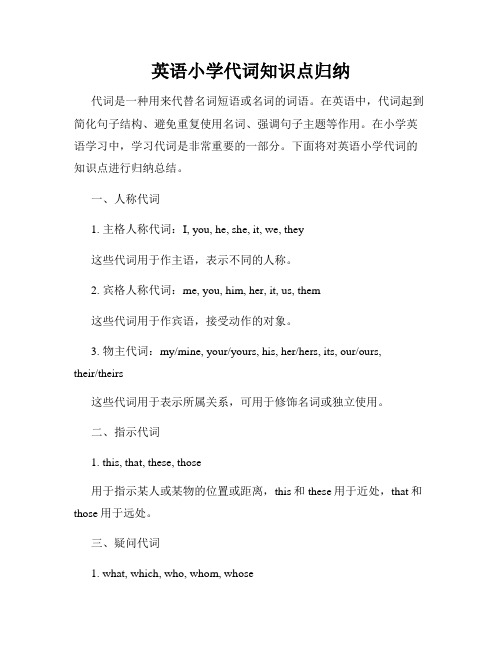
英语小学代词知识点归纳代词是一种用来代替名词短语或名词的词语。
在英语中,代词起到简化句子结构、避免重复使用名词、强调句子主题等作用。
在小学英语学习中,学习代词是非常重要的一部分。
下面将对英语小学代词的知识点进行归纳总结。
一、人称代词1. 主格人称代词:I, you, he, she, it, we, they这些代词用于作主语,表示不同的人称。
2. 宾格人称代词:me, you, him, her, it, us, them这些代词用于作宾语,接受动作的对象。
3. 物主代词:my/mine, your/yours, his, her/hers, its, our/ours,their/theirs这些代词用于表示所属关系,可用于修饰名词或独立使用。
二、指示代词1. this, that, these, those用于指示某人或某物的位置或距离,this和these用于近处,that和those用于远处。
三、疑问代词1. what, which, who, whom, whose用于提问人或物的身份、特征、归属等信息。
四、不定代词1. some, any用于表示不特定数量的人或物,some用于肯定句,any用于否定句或疑问句。
2. no, none用于表示没有人或没有事物。
五、反身代词1. myself, yourself, himself, herself, itself, ourselves, yourselves, themselves用于指代主语并强调其动作的发出者为主语本身。
六、相互代词1. each other用于表示句子中的主语和宾语相互之间的关系。
七、连接代词1. who, whom, whose, which, that用于连接主句和从句,引导宾语从句、定语从句等。
八、相对代词1. who, whom, whose, which, that用于引导定语从句,修饰先行词。
九、关系代词1. who, whom, whose用于引导定语从句,修饰人的先行词。
小学英语语法-代词

小学英语语法-代词代词是代替名词的词类。
绝大部分代词具有名词和形容词的功能。
英语中的代词能够分为九类:人称代词、物主代词、反身代词、相互代词、指示代词、疑问代词、关系代词、连接代词和不定代词。
一、人称代词1、人称代词是表示"我"、"你"、"他"、"她"、"它"、"我们"、"你们"、"他们"的词。
人称代词有人称、数和格的变化,见下表:单数复数格主格宾格主格宾格第一人称 I me we us第二人称 you you you you第三人称 he him they themshe her they themit it they them2、人称代词的用法(1)代词作主语时用主格,作宾语时用宾格:He has great concern for them. 他很关心他们。
They all like him very much. 他们都很喜欢他。
She gave the books to you and me. 这些书是她送给你和我的。
(2)人称代词作表语时,用宾格时较多,特别是在口语中,例如:Who is knocking at the door?-It’s me. 谁敲门?-是我。
If I were her, I would take the advice. 我要是她就接收这个意见。
Imagine yourself to be me. 设想你是我。
但在下面这种结构中却常用主格:It was he who did it.It is she who wants it.在表示比较的非正式的文体中,常用宾格代替主格:He is more intelligent than her.He is taller than I am.3、在使用人称代词时还应注意以下几点:(1)we, you两词有时可用来泛指一般人:We (you) have to be cautious under such circumstances.在这样的情况下大家应特别小心。
小学英语必备代词(带音标)
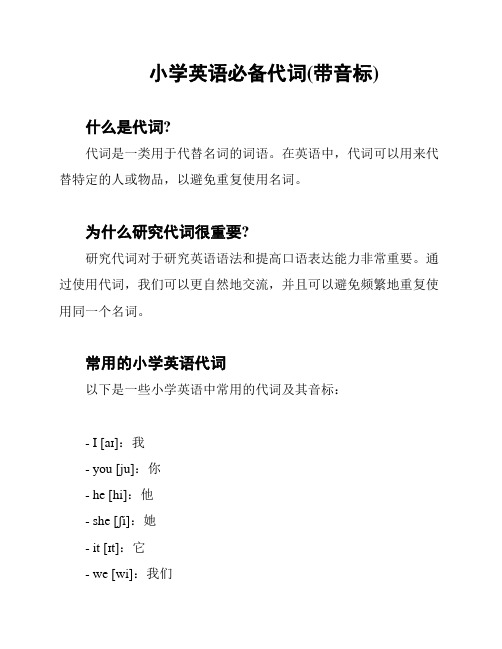
小学英语必备代词(带音标)
什么是代词?
代词是一类用于代替名词的词语。
在英语中,代词可以用来代替特定的人或物品,以避免重复使用名词。
为什么研究代词很重要?
研究代词对于研究英语语法和提高口语表达能力非常重要。
通过使用代词,我们可以更自然地交流,并且可以避免频繁地重复使用同一个名词。
常用的小学英语代词
以下是一些小学英语中常用的代词及其音标:
- I [aɪ]:我
- you [ju]:你
- he [hi]:他
- she [ʃi]:她
- it [ɪt]:它
- we [wi]:我们
- they [ðeɪ]:他们/她们/它们
这些代词可以用来代替特定的人或物。
例如,当我们谈论自己时,可以用"I"代替自己的名字。
同样地,当我们谈论其他人时,可以使用相应的代词进行替代。
更多常见的代词
除了上述提到的常用代词外,还有其他一些常见的代词:
- my [maɪ]:我的
- your [jɔr]:你的
- his [hɪz]:他的
- her [hɜ:r]:她的
- its [ɪts]:它的
- our [aʊə]:我们的
- their [ðɛər]:他们的/她们的/它们的
这些代词通常与名词搭配使用,用于表示归属或所属关系。
总结
代词在英语中起着非常重要的作用,可以使我们的语言表达更加简洁和流畅。
通过研究并熟练掌握这些代词,我们可以提高英语的口语交流能力,并更好地理解和使用英语语法。
希望以上内容对您有所帮助!。
小学英语代词
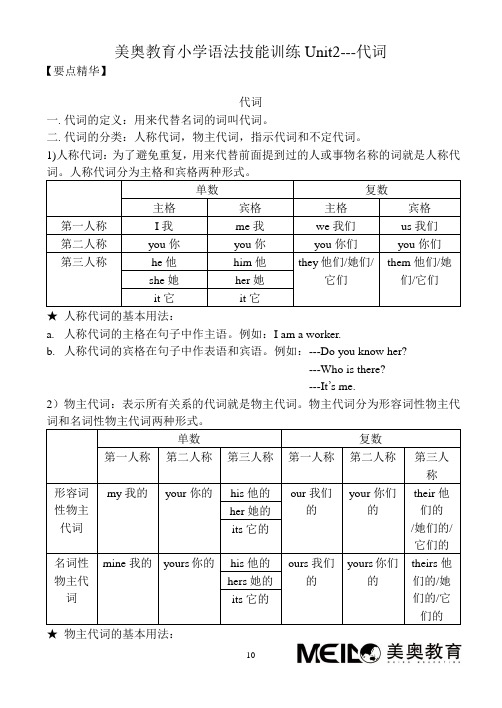
【要点精华】代词一.代词的定义:用来代替名词的词叫代词。
二.代词的分类:人称代词,物主代词,指示代词和不定代词。
1)人称代词:为了避免重复,用来代替前面提到过的人或事物名称的词就是人称代★人称代词的基本用法:a.人称代词的主格在句子中作主语。
例如:I am a worker.b.人称代词的宾格在句子中作表语和宾语。
例如:---Do you know her?---Who is there?---It’s me.2)物主代词:表示所有关系的代词就是物主代词。
物主代词分为形容词性物主代★物主代词的基本用法:a.形容词性物主代词只能作定语。
例如:This is her box.b.名词性物主代词具有名词性质,相当于“形容词性物主代词+名词”。
例如:This classroom is not ours. It’s theirs.c.形容词性物主代词位于所修饰的名词之前,根据名词的属性,数的变化而变化,而不根据名词本身变化。
例如:I have my keys.I have their keys.3)指示代词:表示“这个”“那个”“这些”“那些”等指示人或事物的代词就是指示★指示代词的用法:指示代词在意义上有远近的差别。
this/these指代近处的物体,that/those指代远处的物体。
例如:This is a car.That is a ship.4)不定代词:不指明代替任何特定名词或形容词的代词就是不定代词。
常见的不定代词有everything, everybody, many, much, a few, a little, some, any等。
★不定代词的用法:a. some和any的用法:两者都有“一些”的意思,some用于可定句中,any用于否定句和疑问句中。
但在表示请求,征求建议,邀请等意愿的疑问句中,当提问者希望对方做出肯定的回答时,用some。
例如:We can speak some French.There isn’t any food in the fridge.b.both和all 的用法:两者都有“都”的意思,表示整体的含义。
小学阶段英语知识整理-代词、数词、疑问词
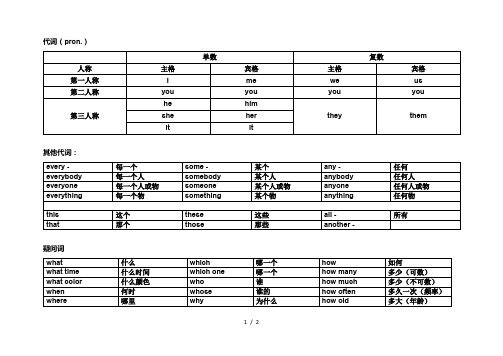
two
2
twelv
12
twenty
20
second
第二
three
3
thirteen
13
thirty
30
third
第三
four
4
fourteen
14
forty
40
fourth
第四
five
5
fifteen
15
fifty
50
fifth
第五
six
6
sixteen
16
sixty
60
sixth
第六
seven
百万
forty-three
43
forty-first
第四十二
forty-seventh
第四十七
代词(pron.)
单数
复数
人称
主格
宾格
主格
宾格
第一人称
Imeweus来自第二人称you
you
you
you
第三人称
he
him
they
them
she
her
it
it
其他代词:
every -
每一个
some -
某个
any -
任何
everybody
每一个人
somebody
某个人
anybody
任何人
everyone
每一个人或物
多少(可数)
what color
什么颜色
who
谁
how much
多少(不可数)
when
何时
whose
- 1、下载文档前请自行甄别文档内容的完整性,平台不提供额外的编辑、内容补充、找答案等附加服务。
- 2、"仅部分预览"的文档,不可在线预览部分如存在完整性等问题,可反馈申请退款(可完整预览的文档不适用该条件!)。
- 3、如文档侵犯您的权益,请联系客服反馈,我们会尽快为您处理(人工客服工作时间:9:00-18:30)。
人称代词和物主代词
一、人称代词
表示“我”、“你”、“他”、“她”、“它”、“我们”、“你们”、“他们”的词,叫
做人称代词。
人称代词有人称、数和格的变化,见下表:
单数复数
人称
主格宾格主格宾格第一人称I me we us
第二人称you you you you
he him
第三人称she her they them
it it
(1)人称代词主格:作主语,表示谁怎么样了、干什么了。
如:
I am a teacher.You are student.He is a student, too.
We / You / They are students.
(2)人称代词宾格作宾语,表示动作行为的对象。
如:
Give it to me.Let ’s go (let’s =let us)
二、物主代词
表示所有关系的代词叫做物主代词,也可叫做代词所有格。
物主代词分形容词性物主代词和名词
性物主代词二种,其人称和数的变化见下表。
单数复数
数、人称、类别
第一人称第二人称第三人称第一人称第二人称第三人称
形容词性物主
my your his her its our your their 代词
名词性物主
mine yours his hers its ours yours theirs 代词
形容词性物主代词 ( my / your / his / her / its / our / their )+名词。
如:
her book my teacher his bike
(2)名词性物主代词则相当于“形容词性物主代词+名词” , 故其后不必加名词。
如:
Is this your book?
No, ,it isn’t, it ’s hers(her book)
This pen is mine.
人称代词与物主代词用法的练习题(2008-10-29 22:59)
分类:英语习题
人称代词与物主代词用法的练习题
一、填表
单数复数
人称
主格宾格主格宾格第一人称I we
第二人称you you you
him
第三人称she they
it
二、填空:
1.Let _____ (I) help ____ (you).
2.Let _____ (we) go.
3.(I) _____ are students.
4.I
can't find _____ (they).
5.Give ____ (he) the book.
三、选择
1.________are in the same class.
A.Her and me
B.She and l
C.Me and her
D.l and she
2.Please call ___ at 256-5896
A me
B my
C I
D mine
3.-Do you like these computers? -
No,I don't like_______.
A it
B them
C they
5.Our tercher think_______are right.
A.We
C it D she
6.______go to the party.
A.He,I and you
B.I, you and he
C.You,I and he
D.You,he and I
四、用括号中的适当形式填空:
( 1) Are these ________( you )pencils?
Yes, they are ________( our ) .
02)— Whose is this pencil?
—It ’ s ________ (I ) .
( 3) I love ________(they ) very much.
( 4) She is________ (I ) classmate.。
